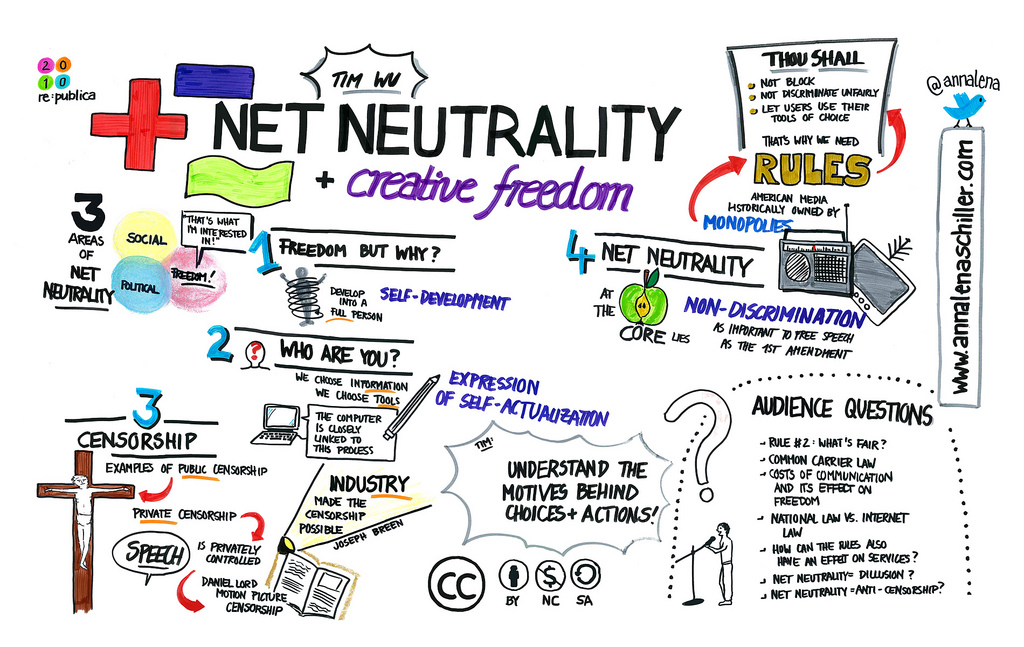In case you missed or avoided the CRTC net neutrality hearing, I thought I would post a few reflections (my summaries of the events are available at Day 1, 2, 3, 4, 5, 6, and 7; additional coverage NetNeutrality.ca). While there were some notable anecdotes and quotes (Rogers comment about traffic managing a cure for cancer come to mind), I would point to six key revelations that evolved over the course of the week and a half.
1. The rate of network traffic growth is slowing. This was raised midway through the first week by Professor Odlyzko and was subsequently confirmed by several ISPs. The revelations ran counter to the general sense before the hearings that ISPs cannot keep pace with the rate of growth. In fact, it turns out the opposite is true – reasonable new investment in the networks can address current growth rates.
2. There is a wide variation in the use of traffic management tools with a different approach for pretty much every major ISP. There are those that throttle all the time (Cogeco), during large chunks of the day (Bell), only during congested periods (Shaw), or not at all (Telus, Videotron). There are those that throttle upload only (Rogers) or upload and download (Bell). There are those that use "economic measures" such as bit caps effectively (Videotron) and others that doubt it can be an effective approach on its own (Bell). This points to the fact that granular rules will be difficult, but broader principled tests are essential.
3. The rules for retail and wholesale will be different. The hearing surprisingly included a near-rehearing of the Bell v. CAIP case. Wholesale services were much discussed as the CRTC recognized the potential of independent ISPs to inject additional competition into the marketplace. Based on the evidence, it would appear that the problems with wholesale are largely a Bell problem. Many other ISPs that offer wholesale services do not traffic manage or have such small wholesale businesses that the impact is fairly small. Bell is a big player in the wholesale side and they have designed their network in a manner that makes it difficult to fully exploit the competitive potential of smaller entrants. While CAIP argued for rules against wholesale throttling but against retail restrictions (thereby abandoning consumer interests), the opposite seems more likely to occur.
4. Disclosures are woefully inadequate in Canada. Each day brought new and surprising revelations about how little ISPs tell their customers about their traffic management practices. By far the most egregious was Rogers, which admitted that it charges tiered pricing for faster upload speeds but that all tiers were throttled to the same speed when using P2P. In other words, the Extreme subscriber who pays $59.99 per month and is promised fast upload speeds (1 Mbps) actually gets the same upload speed as the Express subscriber who pays $46.99 per month and is promised upload speeds of 512 kbps. There were similar stories from many other ISPs, who disclosed actual speeds that bring P2P down to a virtual crawl. Disclosure has improved over the past year as the issue has gained prominence, but there clearly is a long way to go.
5. Managed networks vs. public Internet. ISPs do not focus on the fact that many run managed IP networks offering telephony and IPTV on the same pipe as the public Internet services. When asked whether the two impact each other, the answer came back that it could. In fact, ISPs were at pains to say that while it could happen, it would not happen since they ensure that they provision enough bandwidth for their managed services. Yet in examples such as Bell's three users promised 5 megs but with only 10 megs to share, it was apparent that the same cannot be said for oversold public Internet services.
6. The Commission takes privacy seriously. The ISPs seemed surprised that the Commission regularly asked about the privacy impact of throttling and deep-packet inspection. The Commission was similarly surprised when Bell admitted that Canadian privacy law would permit the use of DPI data for marketing purposes with the customer's consent.
Where to from here?







